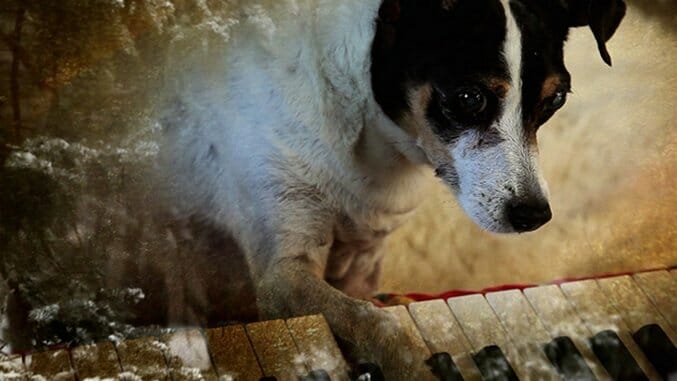As one might guess from the title, the genesis of Laurie Anderson’s remarkable new film essay is a dog—specifically, her rat terrier Lolabelle…and even more specifically, Lolabelle’s death. Though it is melancholy, Heart of a Dog is hardly funereal. Instead, the personal loss—plus two other human losses; more on those later—has inspired in Anderson a wide-ranging meditation on life, death and the unfathomable mysteries of what lies beyond.
Some of the details she includes are specific, topical even. Anderson features anecdotes about deaths she’s heard of and/or experienced, like the very public, final 24 hours of architect Gordon Matta-Clark’s life, or her own hospital stay after a diving accident threatened to leave her paralyzed. Others, however, are broader in scope. Post-9/11 fears are a major thematic thread—not only the immediate devastation, but longer-lasting ramifications: increased police presences in major NYC transit hubs, for example, or more invasive national security measures.
Still, Heart of a Dog broaches broader and cosmic dimensions in its death-haunted meditations. A pastoral California getaway with Lolabelle, for instance, leads to an incident involving a hawk which Anderson, based on her dog’s reactions, interprets as Lolabelle’s sobering first brush with the threat of mortality. Anderson, thanks in large part to her own Tibetan-Buddhist leanings, occasionally ventures into outright philosophizing. One of the film’s more memorable bits deals with the grieving process—specifically, the empathetic idea of being able to “feel sad without being sad.” Thinking about what lies beyond this mortal coil, Anderson devotes an extended sequence to speculating about what happens to people during and after the “bardo,” the Tibetan-Buddhist term for a 49-day purgatorial state between two planes of existence.
Much of Anderson’s musings are supported by her usual trippy musical style: evocative low-register synthesizer droning, electronically amplified cello lines, a paradoxical vibe of alienating cool. Visually, however, Heart of a Dog is a striking mixed-media collage, with Anderson assembling home movies (some of them digitally manipulated), fictionalized reenactments, archival footage, surveillance videos and the occasional animated sequence. At one point, she mentions her love for Francisco Goya’s painting “The Dog,” and much of the ensuing home-movie footage is tinted with the gold tones Goya used on his canvas. It’s indicative of the kind of impressionistic imagination Anderson brings to her images in the film.
The end result recalls some of the density of a Chris Marker or Jean-Luc Godard essay film—the feeling of dropping in on an artist’s undigested thoughts as the artist is working through them in the moment. Heart of a Dog may not consistently approach the intellectual headiness of either of those artists at full blast, but Anderson isn’t merely going for the cerebral here. As is the case with her recordings and live performances, she delivers her voiceover narration in a deliberately detached manner, with a hint of sly deadpan humor. But thanks in part to the at times deeply candid nature of the images, anecdotes and impressions she offers, the film always exudes a poignant sense of the personal, of an artist contemplating her own experiences from a reflective distance.
Some of those experiences are only hinted at rather than expressly stated. Though the death of Lolabelle is the ostensible spur for this film, equally important is the more recent passing of her husband, Lou Reed. The legendary rock artist is seen in only one bit of home-movie footage (on a beach with herself and Lolabelle), but Anderson dedicates the film to him at the end and includes one of his later songs—the appropriately wistful “Turning Time Around,” from his 2000 album Ecstasy—over the end credits.
Even that subtextual undercurrent, however, doesn’t quite approach the emotional power of the film’s final 10 minutes, when Anderson mentions another recent death in her circles: that of her mother. Because she was never really close to her, she admits to finding herself swimming with regrets—the kind of regrets that, earlier in the film, she suggested made the experience of death more often about the griever than the person being grieved. Suddenly, though—illustrated with digitally manipulated home-movie footage of Anderson as a child on an icy pond skating with two baby twin sisters—she remembers one brief, shining moment in which her mother seemed to “love her unconditionally.” With this closing memory, Heart of a Dog reveals itself to be nothing less than an artist’s own personal therapy session, one that thankfully broadens its scope beyond the borders of Anderson’s memories and impressions to touch profoundly and poignantly on universal human experience.
Director: Laurie Anderson
Writer: Laurie Anderson
Release Date: Oct. 21, 2015
Kenji Fujishima is a freelance film critic, contributing to Slant Magazine, Brooklyn Magazine, The Playlist and the Village Voice. He is also Deputy Editor of Movie Mezzanine and former editor-in-chief of In Review Online. When he’s not watching movies and writing and editing film criticism, he’s trying to absorb as much music, art and literature as possible. He has not infrequently been called a “culture vulture” for that reason.
